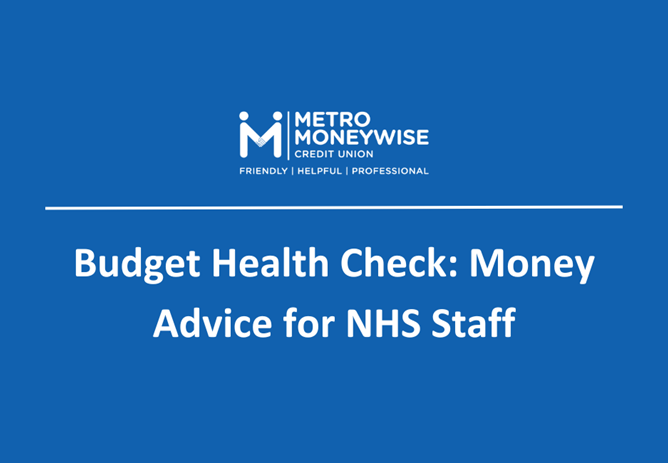16 September 2025
Budget Health Check: Money Advice for NHS Staff
Working in the NHS often comes with long shifts, irregular hours and a demanding workload. In recent years, that’s been paired with the rising cost of living and even greater demand on the health service.
It’s no surprise that some NHS staff don’t feel like their finances are in tip top condition. Consider this article a financial health check up for your money wellbeing. We’ll discuss how to assess your financial health, look at the support available for NHS workers and run through some steps you can take to become more financially fit and healthy!
Assessing your financial health
Before making changes, start with a quick “diagnosis” of your money situation:
- Income vs expenses: Write down your monthly take-home pay and compare it with your regular outgoings. A budgeting app can help spot where your money goes.
- Debt check: List credit cards, overdrafts or loans and note the interest rates. This makes it easier to prioritise repayments.
- Savings & emergency fund: Do you have enough to cover 3-6 months of essential expenses? If not, set a small target to build towards.
Think of this as taking your financial pulse. It shows you where to focus next:
- If your expenses outstretch your incoming, it’s worth looking what cutbacks you can make – unused subscriptions and takeaways are common culprits.
- If your debt is getting out of control, look at repayment strategies to minimise interest and clear some of what you owe.
- If you’re just low on savings, try and set more aside each week or month so you’re better prepared for unexpected costs (there’s always something!)
NHS-specific benefits and support
One of the perks of working in the NHS is access to money-saving benefits, such as:
- NHS Discounts: From supermarket deals to reduced gym memberships, there are lots of NHS discounts available – many through the Blue Light Card.
- NHS pension: Don’t underestimate its value – it’s one of the most generous pensions in the UK. While this won’t help you now, it’s an essential step for long-term financial security.
- Tax relief: You can claim for washing your uniform, professional fees and work-related travel. Check HMRC’s website for guidance.
- Employee assistance: Many Trusts offer financial wellbeing advice and hardship funds. These are worth asking about if you’re struggling.
- Credit unions: It’s worth noting that there are several credit unions for NHS staff too, with Metro Moneywise among them. We offer lifelong support for members looking to save and borrow.
Related: Why Choose a Credit Union as an NHS Employee.
Smart budgeting for NHS workers
Whether you’re working unsociable shifts or balancing a 9-5 with parenting responsibilities, it can be hard to keep costs down. Here are few simple steps that could save you big money over time:
- Meal Prep: Taking meals to work saves money on pricey hospital canteens or takeaway food. That £5 meal deal for lunch works out at over £1,000 a year if you get one five days a week.
- Transport: Check if a season ticket or a travel card is cheaper or consider bike-to-work and car-sharing options. If you’re based around Greater Manchester, you can spread the cost of Annual Bee Network Tickets thanks to an initiative by the SoundPound Group.
- Utilities: Energy use often spikes during odd hours. If you’re a shift worker, you might be able to use this to your advantage. Compare tariffs to see if there’s a better fit for your lifestyle.
Managing debt wisely
Debt can spiral out of control if it’s not nipped in the bud. But you’re not alone if you’re struggling to pay off loans, credit cards or products you bought or finance. Here’s how to tackle it step by step:
- Focus on paying off high-interest debt first, like credit cards. This will stop debt growing as fast to avoid the problem becoming worse.
- It may help to consolidate your debt if you can find a loan with lower interest and arrange affordable repayments. Check out our NHS staff loans as an example.
- Seek free help from StepChange, MoneyHelper, National Debtline or Citizens Advice. They’ll guide you without judgement.
- Manage your spending and avoid buying things on finance. Don’t panic and resort to payday lenders, who charge extortionate rates to vulnerable people.
Growing your savings

Once debts are under control, look at building your financial resilience.
Setting your targets
Firstly, set realistic targets. Maybe you want to have £500 set aside for a rainy day, or perhaps you’d like £2,000 for your next summer getaway. Then decide how you’ll achieve it. That could be £10 a week or a percentage of your pay each month. Having a separate account for savings can make it easier to ringfence them.
Payroll saving schemes
Payroll saving schemes like ours are a great way to get started, because they make saving automatic and stress-free. The money comes straight out of your salary before you get a chance to spend it! Before you know it, you’ll have a decent little pot saved up for a rainy day.
Help to Save ISA
Consider government help too. The Help to Save ISA is a good option if you’re on Working Tax Credit or Universal Credit. You can save up to £50 per month for four years, and the government will give you a 50% bonus on the highest balance you achieve. That’s up to £1,200 on top of what you’ve saved.
Lifetime ISA
Alternatively, the Lifetime ISA is available for anyone aged 18-39 – ideal if you’re saving for your first home. You can save up to £4,000 per year with a 25% bonus from the government – that’s up to £1,000 extra each year.
Increasing your income
Growing your income is another option, though we recognise that it’s not practical for everyone. UK taxpayers are entitled to a £1,000 tax-free allowance for side income, making it a great way to give your bank balance a boost, even if you don’t have much time to spare.
Some popular side hustles include:
- Babysitting and childcare
- Delivery driving or taxi services like Uber
- Pet sitting and dog walking
- Offering private care work in your spare time
Support on your finance health kick
Just like your health, your finances benefit from regular check-ups and small, consistent improvements. By making the most of NHS benefits, managing your spending and planning for the future, you can build financial resilience and reduce money stress.
Remember – you’re not on this journey alone. Metro Moneywise welcomes all NHS staff as part of our common bond, giving you access to lifetime savings, support and responsible loans when needed. Join today or contact us for more information.



